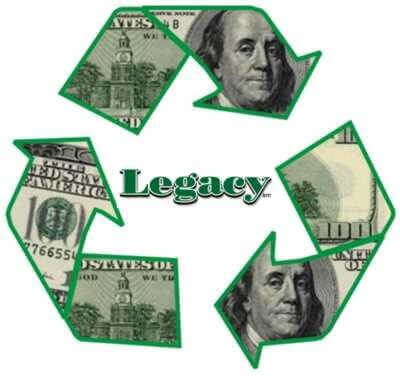
Truths About Whole Life Insurance
Truth is In. Myths are Out.
These truths about whole life insurance may seem to be obvious, but it is human nature to have conflicted feelings about those things we would prefer not to face or act upon. No one likes to consider the possibility of their dying — and of course, there’s no requirement that people own life insurance. Most buy it because they “love someone” or “owe someone.”
Understanding the truths we’ve explored here can help you assess your needs and make more objective and informed decisions about the life insurance you purchase — for the long-term protection of your loved ones.
Times have changed. The way many Americans view their finances today has shifted dramatically over the past few years. Today, individuals are looking to take less financial risk than ever before.
Consequently, a growing number of consumers are rediscovering a financial product that has been available for years — Whole Life insurance.
The main purpose of Whole Life insurance is to provide valuable guaranteed financial protection whenever the insured should die. But what many do not realize is that it’s so much more. Whole Life provides a wide array of financial benefits, including “living benefits” — a term that refers to the fact that a Whole Life policy provides a ready source of funds for any purpose throughout the policyowner’s lifetime or during key income-producing years.
For many years, some financial experts have attempted to discredit Whole Life insurance — while promoting the supposed benefits of other insurance policies that, in certain market environments, seemed to offer higher returns at lower costs. But what we’ve learned in recent years is that some policies ultimately required some policyowners to pay additional premiums in order to keep their policy in force. For many, the “recovery” cost was beyond reach. The good news is that doesn’t happen with Whole Life.
Much of the information in this blog post was gathered from Guardian Life’s publication, Exploring Key Truths about Whole Life Insurance: www.guardianlife.com

These other policies (IUL/VUL/UL) were created by the very financial institutions that were distorting the truth about whole life. And, many tried to actually call them whole life policies, though they were not.
We don’t have to get into the differences between the types of policies and companies here, just realize that what we’re talking about in this post is traditional, dividend paying whole life insurance. These policies are participating, meaning they can pay (and have consistently for 100+ years) a dividend, and are purchased from a mutual life insurance company.
Now that we’ve examined some truths, let’s take a look at some myths.
“Myths which are believed in tend to become true.” ~George Orwell
What makes theses myths so destructive is that they are based on a scarcity mindset and are perpetuated from generation to generation. When we embrace the scarcity mindset we are buying into the belief that our resources are limited.
You may have heard some of these untruths or myths:
1. You should, buy term and invest the difference.
2. When you retire you’ll be in a lower tax bracket.
3. When you retire you won’t need life insurance.
Let’s examine these myths and untruths.
“You should buy term and invest the difference.” – The truth is most people never invest the difference. But, if they did… Many agents/advisors have convinced them that they will earn 10-12% returns. This is almost laughable when you understand how financial professionals are allowed to legally hoodwink investors into believing this lie.
According to a report from well respected research firm, DALBAR, Inc., the average investor in asset allocation mutual funds earned only 1.85% per year over the last 30 years and the average investor in equity mutual funds averaged only 3.69% per year. And, that’s before fees, taxes and inflation.
The worst part is… The term insurance expires when you need it the most, at retirement. This was the case for my Dad, and 10 years later my Mother has very little income because his term insurance ran out when it was needed.
“When you retire you’ll be in a lower tax bracket.” – Do you believe this? If you do, Robert Kiyosaki (Rich Dad Poor Dad), says you are saying that you are going to be poor. Inflation, the stealth tax is eroding your money faster than you can save it, and your health is declining while you are getting older.
For an example, let’s say you are currently earning $100,000 per year, and you have 20 years until retirement when you’ll be 67. This is the time that Social Security says you can retire to get your full benefit. Over your working years you contributed to your 401k and the balance is now $1,000,000. Now you are faced with choices on how you will spend that money. Traditional planning says you can spend 4% per year without fear of running out of money. If you are making $100,000 per year now, could you possibly live on $40,000? Oh, I forgot to mention that after inflation, it will take $ to spend like $100,000 does now. What does retirement mean to you anyway? Will you want to take those vacations you’ve been putting off? Will you want to do things for your kids and grandkids? Back to the taxes and your bracket, if you follow traditional advice, when you retire your house will be paid for and the kids will be grown… So, you won’t have those tax deductions.
So, before you believe that myth, you may want to ask yourself these questions:
1. What tax bracket will you be in at retirement?
2. What tax deductions will you have in the future?
3. Do you think taxes are going up or down?

“When you retire you won’t need insurance.” – When talking heads say this, they should be charged with malpractice! Any talk show host, agent or advisor that tells you this should lose their license.. If they even have one.
In reality you may not need it, but that’s only because you are not forced to have it, unlike auto and property insurance. If you do you have it, you’ll you’ll be glad you do.
My experience of of over a decade being a life insurance agent is that seniors want life insurance more than anyone, but unfortunately can always get it because of health issues. This is even more reason to purchase whole life insurance when you are young and healthy.
“Time And health are two precious assets that we don’t recognize and appreciate
until they have been depleted.” ~Denis Waitley
At retirement you are more vulnerable than ever to loss. And, the fact is if you do want it you may not qualify for it medically. There is no such thing as “self insurance”. In order for you to fully self insure, you have to calculate the value of your asset in liquid cash in the event of a loss. Just remember, YOU ARE THE ASSET. What are you worth to your family? Will you have that when your time comes?
And, if you understand how whole life insurance works, you can use it to leverage your other assets and create more spendable income at retirement. Retirement income is where the rubber meets the road, you’ll want as much tax advantaged income as possible.
As you can see these myths can destroy your ability to create wealth and your value as a person. Instead when you take the time to educate yourself with the truth, you can decisions that you can feel good about.
Here are just a few reasons you may want to own as much of it as you can. To clarify we are talking about lifelong, guaranteed, whole life insurance.
Guaranteed level premiums – When you purchase a whole life policy, the premiums that can’t be increased. You’ll also know that your loved ones would receive a guaranteed, lump-sum payment as your beneficiaries. And, if you choose, your business could be a beneficiary.
Cash value accumulation – You can also build a significant cash asset that’s not dependent on the rise or fall of the stock markets. You can borrow against the cash value portion of your whole life insurance policy without qualifying credit score to use however you like. Reasons such as a down payment for a home, college funding, or a business loan.
Potential dividend payments – Mutual life insurance companies pay dividends, this means that you may receive an amount of money based on the company profits. While not guaranteed, the payments have historically been made every year since the 1800’s.
Tax benefits – Whole life insurance has many tax benefits, one of which is the tax-advantaged buildup of cash value. This means that you defer paying tax on the dividends you’re accumulating. Over time, that can add up to a considerable amount of cash value. And, if used correctly, you nor your family may ever have to pay taxes on the growth.
Tax-advantaged asset for loans – If you need to borrow against your cash value, for an emergency or any other purpose, the loan may not count as income for taxation, as long as your policy remains active and meets MEC guidelines when issued.
Barry Page
Please Like and Share this post.
Subscribe to our YouTube channel: https://www.youtube.com/legacymoney
